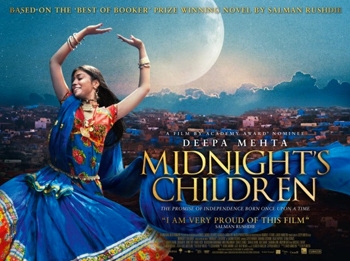LFF 2012: Midnight’s Children **
 The adaptation of Salman Rushdie’s novel and Booker Prize winner Midnight’s Children by the author himself was obviously a labour of love, what with the author providing the eloquent narration, as well as an exciting prospect for fans. But Midnight’s Children proves a valuable point that sometimes the originator is not necessarily the best person to adapt his or her story for the big screen; that’s when film-making talent is required to lift the written word, visually, off the page.
The adaptation of Salman Rushdie’s novel and Booker Prize winner Midnight’s Children by the author himself was obviously a labour of love, what with the author providing the eloquent narration, as well as an exciting prospect for fans. But Midnight’s Children proves a valuable point that sometimes the originator is not necessarily the best person to adapt his or her story for the big screen; that’s when film-making talent is required to lift the written word, visually, off the page.
This is where there is a sense that although Indian film-maker Deepa Mehta (Elements trilogy) as director on this takes the bones of the novel and makes the film visually sumptuous, there is a lot of drag and over indulgence, which results in a loss of charm in places. The fact that by the time the intriguing characters grow into adulthood, their paths, hopes and dreams become scattered and less interesting as their futures become more moulded by caste is evidence of this.
Midnight’s Children has been produced in a touching and magical way of visually addressing the birth and border friction of a great nation – India at midnight on 15th August 1947, with a lot of spirit and superstition. Indeed, that Saleem Sinai (Satya Bhabha as the adult Saleem), son of a poor mother and rich Englishman, with a large, problem nose, who is swapped at birth in a political and ill-thought out manoeuvre by the hospital nurse with Shiva (Siddharth), son of a wealthy Indian couple, can conjure up the other children born at the stroke of midnight too, using magical powers, is a sensitive way of political and social portrayal.
That said capturing the imagination in this way starts to wear thin as the story itself loses steam and pace. The characters overcrowd the important, dramatic moments, reminding us just how long and episodic (at two and a half hours) the film actually is – almost like watching a back-to-back TV series. In fact, without some historical context of Saleem’s origins, there would be very little character development of interest to sink your teeth into – something that does not translate well to screen from the book. Thankfully, Bhabha has enough charisma to lead the whole affair, or the Rushdie- Mehta film would blend into insignificance and tedium, however well meaning and ironic it is trying to be.
2/5 stars
By @FilmGazer